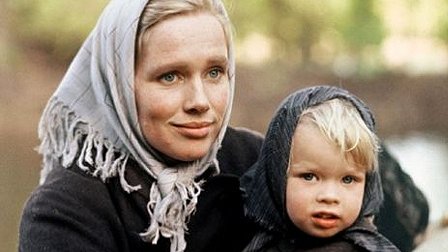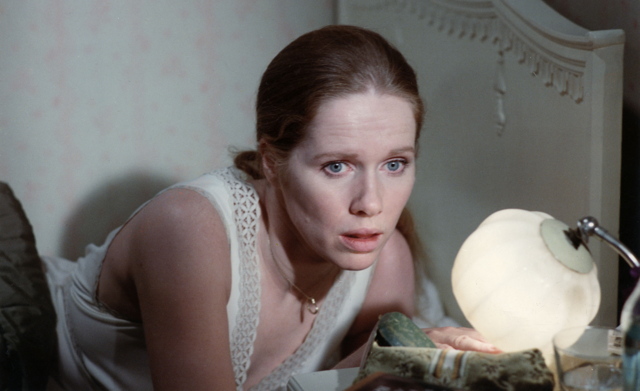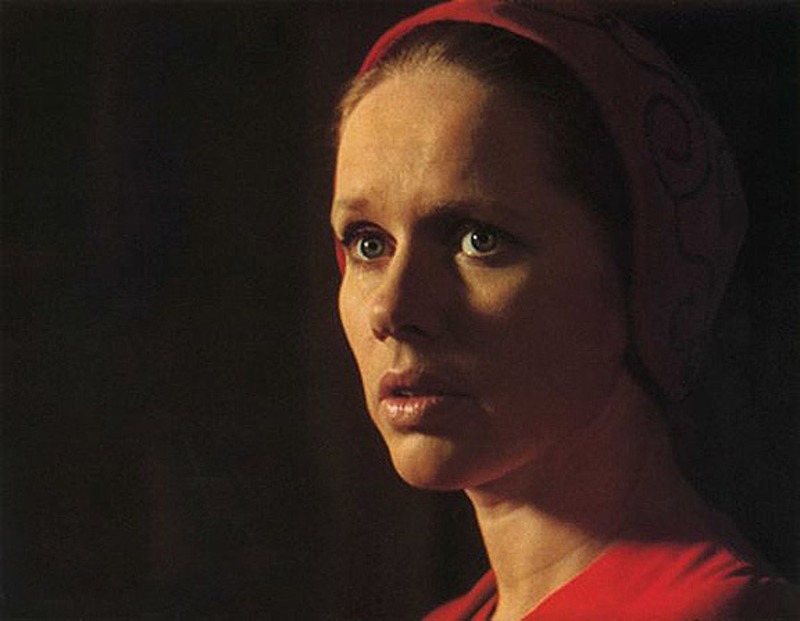abstew here. With her second nomination for Two Days, One Night, Marion Cotillard joins a small but prestigious group of actresses that received both their Best Actress nominations for foreign language performances. The first actress to achieve it was Sophia Loren who we discussed over the weekend. Today we look back at the Norwegian muse of the master Ingmar Bergman...
Liv Ullmann
after the jump
Best Actress 1972 nominee: The Emigrants (dir. Jan Troell) Winner: Liza Minnelli Cabaret Other nominees: Diana Ross Lady Sings the Blues, Maggie Smith Travels With My Aunt, Cicely Tyson Sounder
Best Actress 1976 nominee: Face to Face (dir. Ingmar Bergman) Winner: Faye Dunaway Network Other nominees: Marie-Christine Barrault Cousin Cousine, Talia Shire Rocky, Sissy Spacek Carrie
There is perhaps no other director that brought the world of Swedish film to the rest of the world as effectively as the legendary Ingmar Bergman. And the actress that is perhaps most associated with him is two-time Best Actress Academy Award nominee, Liv Ullmann. Bergman and Ullmann collaborated on 10 films together and for 5 years were even lovers in real life. (Bergman is also the father to Ullmann's only child, Linn.) And there's no doubt that Ullmann's riveting performances in Bergman's influential and highly regarded films, especially Persona (1966), set the ground work for Ullmann's first Best Actress nomination, which surprisingly wasn't even for a Bergman film.
After her work in Bergman's Persona, Shame (1968), and The Passion of Anna (1969) there was simply no way that the Academy could ignore Ullmann any longer. With Oscar, there's always a certain sense, after several strong performances and buzz, that it's someone time - they're due a nomination. A critic's darling and art house favorite, Ullmann finally scored a Best Actress nomination for her work as Kristina, a Swedish peasant that immigrates to the United States in the 1850s with her family and fellow villagers. It's just the sort of classic American Dream story that the Academy gravitates toward and the film not only brought Ullmann a nomination, but the film itself was nominated for Best Picture, Best Director, and Best Adapted Screenplay.

The only version of the film that I could find was not actually in the original Swedish, but an English-dubbed version that I'm sure contributed to its success among American audiences and the Academy in the 70s. The story is like a Swedish Little House on the Prairie, perfect to warm the heart, and it seems Warner Bros. tried to make it much more accessible without that pesky foreign language...I had the same problem finding an Italian version of Two Women (although in the English-dubbed version, Loren provided her own voice). I find nothing more distracting than watching these versions where the actor's mouths don't match the words coming out of them. So much about the performance gets lost without hearing the native language and I wish that studios would preserve the film as it was originally intended. Regardless of my opinion of these performances and films, it really is a rare feat when a foreign film scores big with the Academy in categories outside of Best Foreign Language Film. They should be remembered and celebrated.
With its almost three hour runtime, gorgeous cinematography, and continent-spanning journey, The Emigrants is epic filmmaking. But Ullmann's warm, lived-in performance grounds the film. Her love and devotion to her family feels real and authentic, but she colors what could become just another dutiful wife and mother role by giving Kristina shades of hesitation and worry. When she lovingly embraces her husband (Max von Sydow) there is also a mix of fear - they can barely afford to feed the children they have. She wants to show affection, but love comes with consequences that she's not sure she can afford.
There are so many different characters in the film and although Ullmann has a small amount of screentime, she makes the most of what she's given. But I'm still a little surprised that such a understated supporting part managed to score her a Best Actress nomination. She even won the Golden Globe for Best Actress in a Drama over Diana Ross' screen debut as Billie Holiday and previous Oscar winner, Joanne Woodward. But there was no way that Ullmann could win the Oscar over the Golden Globe winner for Best Actress in a Musical or Comedy, Liza Minnelli in Cabaret. An iconic performance certainly deserving of the win. (It's also interesting to note that the year's Best Actress race, in addition to Ullmann's foreign language performance, marked the first and only time that two black actresses were nominated at the same time in the category.)

For her second nomination four years later in Face to Face, Ullmann was finally honored for her work in an Ingmar Bergman film. Ullmann plays Dr. Jenny Isaksson, a psychiatrist that finds that there are deep-seated psychological issues that make her feel that she is losing her mind. The film is minor Bergman and the nomination seems to have been a make-up nomination when her work in 1973's Scenes from a Marriage was deemed ineligible for a nomination despite scoring Golden Globe and BAFTA nods.
The film starts off promising as Ullmann deals with a patient that is catatonic, has to move in with her parents while her house is worked on, and, you know, just followed around by a creepy old woman that may or not be real with one crazy eye. But after an attempted suicide, the film turns into an hour and half dream sequence of psychology 101, complete with mommy/daddy issues, fear of abandonment, and a religious-looking red robe and cap all heavily seeped in symbolism. Ullmann throws herself completely into all the self-indulgent, heavy-handed metaphors. One extended monologue in which the camera never moves from her face is astounding in how deeply the actress digs in, a raw nerve of emotion. It's just unfortunate that it never really amounts to anything.
In another interesting Best Actress line-up, Ullmann was not the only foreign language performance honored that year as Marie-Christine Barrault Cousin Cousine was also nominated for her French language performance. But neither were a match for Faye Dunaway's dynamic performance as amoral television network executive Diana Christensen in Network.

Ullmann spends most of her time now as a director of both stage and film. Working with some of the best actresses working today, she directed Best Actress winner Cate Blanchett in a stage production of A Streetcar Named Desire and Best Actress nominee Jessica Chastain in a film version of Strindberg's Miss Julie this past year. But it's her Swedish films from the 60s and 70s, particularly with Bergman, that made her career. I wish that her two nominations were more indicative of her best work, but her place among the greats is assured. She even topped our list of women most deserving of an Honorary Academy Award. Hopefully these two Best Actress nominations won't be her last brush with Oscar.

Do you think Ullmann's two nominations for Best Actress rank as her best work? What two films do you wish she had been nominated for? Speak your mind in the comments.
Previous Actress in this series: Sophia Loren
